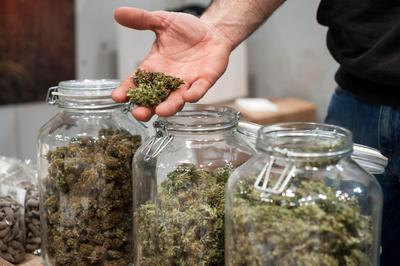Marijuana Myths and Facts

Pop culture perpetuates falsehoods about marijuana. Health Street breaks down fact from fiction.
Marijuana has actually been around for centuries, though its use as a casual recreation drug became popular only in the 1960s. With so many myths out there, how do you separate the truth from the myths about the dangers of marijuana use, including possible addiction?
Myth #1. There is no such thing as a marijuana "addiction"
Fact: An addiction is characterized as the dependence on sustaining an altered brain chemistry. This altered brain chemistry involves users actively making the choice to continue using a drug irrespective of the obvious problems it causes in life, work, and relationships. According to the National Institute of Drug Abuse, 30 percent of marijuana users are likely to develop a marijuana use disorder or addiction. This dependence causes a number of withdrawal symptoms if the use of marijuana is discontinued. Withdrawal symptoms include decreased appetite, mood swings, irritability, restlessness, sleep problems, and other forms of physical discomfort for at least 2 weeks after quitting marijuana.
Myth #2. Marijuana addictions do not affect mental health
Fact: Different people have different reasons for using marijuana. Nevertheless, most users agree that the drug causes a slow-down of mental processes, which in the short-term can be desirable and may seem pleasurably mellow. Furthermore, popular media conveys the image that marijuana usage has no long term effects on mental health. The Office of National Drug Control Policy disagrees. A number of studies have concluded that a marijuana addictions works in a manner that is similar to the use of other drugs such as cocaine, alcohol, and heroin. The THC in marijuana works on the cannabinoid receptors of your brain. In turn, this affects and influences your concentration, time perception, memory, thought, etc. Marijuana addictions have been linked to increased risks of anxiety, depression, panic attacks, and other mental health problems such as schizophrenia, particularly in users who start before they are 18 years old as they are four to seven times more likely to develop marijuana addiction compared to those who start later in life. Research indicates that kids between 12 to 17 years of age who smoke marijuana weekly are three times more likely than non-smokers to have suicidal thoughts.
Myth #3. It is better to drive high than to drive drunk
Fact: Driving any vehicle requires your 100% attention. Therefore, neither driving high nor drunk is safe. Even moderate doses of marijuana are known to reduce reaction time, which is, of course, essential to safe driving. Other concerns include loss of depth perception, reduced coordination, and lowered levels of alertness and concentration. According to the National Institute on Drug Abuse, accident-involved drivers with THC in their blood are three to seven times more likely to be responsible for the accident than drivers who do not use drugs.
Myth #4. A marijuana addiction is not as harmful as a tobacco addiction
Fact: Marijuana is touted to be a drug produced by nature. Thereby, most people tend to assume that it is a benign herb, no more harmful than oregano. However, the truth is far from it. According to the Office of National Drug Control Policy, those who regularly use marijuana or are addicted to it open themselves up to at least as much damage as a regular user of tobacco faces. According to the British Lung Foundation, tar from marijuana cigarettes contains higher concentration of cancer-causing chemicals, up to 50 percent more, than tobacco smoke. Research has determined that those who have a marijuana dependence often face the same health issues as those who abuse tobacco, including: chronic coughing and wheezing, breathing problems, and obstructed airways.
Myth #5. You can have a marijuana addiction, and still score high grades in school
Fact: While it is possible that some students can smoke pot and still get straight A's, research shows that these students are the exception to the rule. Marijuana addictions formed before age 21 are known as the most damaging, since the drug infects a brain that is still developing. In most cases, interfering with this process through habitual pot smoking leads to poor academic performance. Research has suggested that continuous cannabis use through the four years of high school results in a lower grade point average and lower SAT scores (compared to non-users). Similarly: kids with a grade D or lower average were four times more likely to have smoked marijuana in the past year than kids with an A average.
The primary active ingredient in marijuana, THC gets rapidly absorbed by a number of organs in your body, and the evidence of usage remains through metabolites stored by the body. The traces of THC and its metabolites may be detected in urine drug tests for casual users from 7 to 14 days after ingestion. For those with a marijuana addiction, a positive result can occur for several weeks in a urine drug test, or several months in a hair test, after they have quit using.




